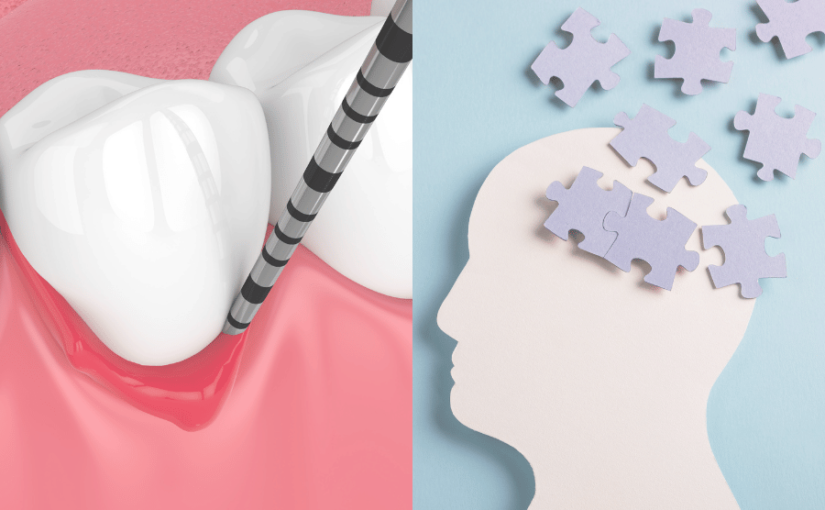By: Dr. Elizabeth Eggert
Keeping our teeth clean for the sake of a healthy mouth is nothing new. Over 5000 years ago, the ancient Egyptians created chew sticks—bamboo sticks with frayed ends—to get food out of their teeth and freshen their breath. They also developed toothpaste made from a combination of powdered ashes. However, in the past 30 years, we’ve learned that the benefits of proper oral hygiene extend far beyond a healthy mouth. In this post, we’ll focus on the link between periodontal disease and Alzheimer’s disease and steps each of us can take to invest in our oral health.
The Ripple Effect of Gingivitis
Every disease process begins somewhere, and periodontal disease is no exception. Periodontal disease starts when harmful bacteria in your mouth form sticky plaque. If thorough brushing and flossing aren’t part of your routine, this plaque can hang out on your teeth and harden into tartar. Tartar is virtually impossible to remove on your own and requires dental skill and instruments to do. If tartar is allowed to persist, it irritates and inflames the surrounding gum tissue, leading to a condition known as gingivitis.
Unfortunately, the cascade doesn’t always stop there. Left untreated, gingivitis can quickly escalate. Gum tissue and bone can start wearing down, and because the bone levels deteriorate, teeth can become loose or even fall out. At the same time, the bacteria that is inflaming the gums can leach into the bloodstream and circulate throughout the body.
This bacteria can cause plaque to build up in a person’s arteries, resulting in atherosclerosis, and putting a person at a higher risk for a heart attack. But it doesn’t stop there. That same bacteria can travel to the brain and destroy nerve cells, leading to memory loss, or Alzheimer’s.
Phew!
Learn more in this summary of a study from the journal of Science Advances.
Fortunately, there are some effective steps each one of us can take to ward off the disease process before it begins!
Prioritizing Oral Health Helps Protect Your Brain
Brush and floss regularly.
Dr. Elizabeth Eggert and Dr. Jeff Eggert can’t stress enough the importance of routine brushing and flossing. When you clean the surface of your teeth and in between your teeth, you remove residual food particles before they have a chance to break down and cause harmful bacteria to grow. In other words, regular brushing and flossing helps ward off gingivitis and periodontal disease. Dr. Elizabeth Eggert and Dr. Jeff Eggert also recommend using fluoridated toothpaste and swishing with a fluoridated mouthwash to keep your enamel strong.
Eat healthy.
The foods we eat have a surprising impact on our oral health and overall wellness. A diet low in sugars and starches minimizes the production of enamel-eating acid that leads to gum disease, tooth decay, and even tooth loss. We’ve established that these destructive bacteria that causes gingivitis and periodontitis can wreak havoc not only on your mouth but also on your heart and brain.
On the flip side, foods rich in healthy fats and omega fatty acids, such as nuts, olive oil, and fish, increase the production of acetylcholine, a chemical that helps your brain create new memories. Avocados, also high in healthy fats, can prevent high blood pressure and reduce the risk of Alzheimer’s disease. And remember to incorporate proteins and foods rich in Vitamin D for optimal brain wellness.
Live healthy.
Tobacco, alcohol, and vaping can interrupt your mouth’s healthy microbiome and contribute to the disease process.
- Tobacco raises the risk of gum disease and slows down the gums’ healing process.
- Alcohol is high in sugar and can kick off the gum disease cascade.
- Vaping contains acidic compounds that can erode tooth enamel, damage the gums, and increase the risk of gingivitis and periodontal disease.
These three habits cause dehydration, reducing saliva production. And because the primary function of saliva is to rinse harmful bacteria from the mouth, these bacteria may persist and grow, leading to eventual periodontal disease. Additionally, in excess, these habits can increase a person’s risk of oral cancer, which can metastasize throughout the body.
Conversely, limiting or avoiding these substances will promote a healthy mouth, brain, and body for life!
Control chronic conditions.
Some chronic conditions, such as diabetes, can increase a person’s risk of gum disease. Carefully managing diabetes and other chronic conditions with diet and medication is a first line of defense against periodontal disease. In addition, be mindful of any routine medications that cause a dry mouth, and take necessary steps to increase saliva production to ward off destructive bacteria.
Schedule regular recare visits.
At Eggert Family Dentistry, we know that one of the most important investments you can make toward oral health and wellness is routine wellness visits with us at Eggert Family Dentistry. At each recare visit, Dr. Elizabeth Eggert or Dr. Jeff Eggert performs several crucial assessments, interprets x-rays, and prescribes a fluoride treatment for your teeth. They proactively care for your teeth, search for early signs of periodontal disease, and take steps to correct or counteract any issues they detect.
Other Factors That Affect Oral Health
Lastly, be aware that other factors, including hormonal changes and genetics, can impact your oral health and ultimately, your brain health. Talk with Dr. Elizabeth Eggert or Dr. Jeff Eggert if you have any oral health concerns!
The link between periodontal disease and Alzheimer’s disease is undeniable, proving that Alzheimer’s disease can start in the mouth. Follow these tips to maintain oral wellness! If you need to set up your next recare visit, reach out to us at 651.482.8412!
